New ‘roots’ Are Possible!

With dental implants, we actually are talking about roots! When you think about dental implants, picture them as artificial roots that provide support to your teeth.
Imagine your tooth as a tree….a healthy root means a healthy tree. Fortunately for us, unlike trees or plants, if we don’t have a healthy root structure for our teeth, we have the option of replacing the root with an implant.
Implants give your bite stability. You can chew better and more comfortable and they reduce the risk of gum disease compared to other options. An implant is like a natural tooth that can’t get a cavity. Bonus. AND they are comfortable and easy to place in the jaw.
Dr. Westman uses in-office cat-scan imaging for accurate planning, patient comfort, and safety when placing tooth-form implants. He can determine if implants may be an option for you. Dental implants Racine by Dr. Westman. The right choice.
Benefits of Dental Implants
One of the other benefits of an implant is that adjacent teeth don’t need to be restored, making implants an attractive option for single tooth and crown replacement rather than a bridge.
Many of our patients who wear conventional lower dentures have been amazed by the improvement in support and chewing function when Dr. Westman has placed as few as two implants.
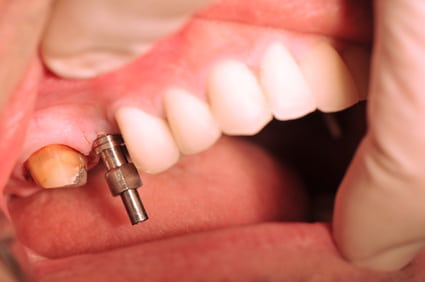
Four to six or more implants can completely eliminate the need for any removable denture while replacing a full set of upper or lower teeth.
Candidate for Dental Implants
If you’re missing a tooth or a couple of teeth, there is no better replacement option than dental implants. They replace the individual tooth or teeth and look and function exactly as a natural tooth does. You’re also a good candidate if you have a tooth with severe decay or damage that likely needs extracting. It should be replaced with an implant.
Replacing all of your teeth with dental implants is not really realistic, but implants also serve as great anchors for either bridge or for full arches of dentures. Dr. Westman places four to six implants per arch. Your full-arch denture then snaps onto the implants. The implants provide the stability and anchoring that wearers of traditional dentures need, but do not get from traditional full dentures. Thanks to the anchoring provided by the implants, denture wearers no longer have to worry about their dentures slipping when chewing or talking.
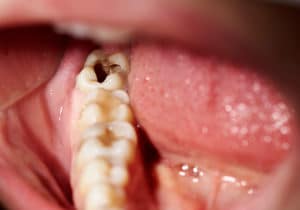

To have implants placed, however, the patient must have adequate jawbone mass. If you’ve been missing a number of teeth in an area for some time you’ve probably lost bone mass in the area. There may not be sufficient bone mass to anchor the implant base without the risk of it failing. This doesn’t mean you cannot have an implant placed; it simply means Dr. Westman will have to do some bone grafting first to build up the jawbone mass. This isn’t a difficult or painful procedure; it just adds some time to the process. In some cases, if you don’t have too much jawbone loss, Dr. Westman can place the titanium implant base along with bone grafting material at the same time.
What’s the Difference Between a Dental Implant and a Bridge?
Dr. Westman feels dental implants are absolutely the best option for replacing a single missing tooth or a couple of missing teeth. Replacing a series of teeth isn’t realistic financially for most patients. Those patients would then opt to have a bridge.
To differentiate, a dental implant is a single tooth replacement consisting of the implant base that is screwed down into the jawbone, the post/abutment that attaches to the implant, and the artificial tooth/crown that attaches to the post. Because the jawbone grows around the titanium implant base it becomes a part of the jawbone. This makes the implant feel and function just like a natural single tooth. Dental implants are all single tooth replacements.
Dental bridges are also meant to replace a missing tooth or teeth. Dr. Westman usually recommends a bridge for replacing more than just a single tooth. The bridge basically spans the gap, like a bridge, created by the missing teeth. A bridge consists of two crowns that are placed over the healthy natural teeth on each side of the gap, with a prosthetic between them featuring artificial teeth fused to metal with acrylic on top of it (to resemble gum tissue). The two crowns and the prosthetic between them are a single piece, the bridge. Bridges are typically cemented permanently onto the two crowned teeth.
Dental implants can be used to anchor bridges.
What is the Process for Getting a Dental Implant Placed?
When considering a dental implant to replace a missing tooth, Dr. Westman first has to make sure you have sufficient jawbone mass to support the implant. If you’ve been missing the tooth or teeth for a period of time, the jawbone under those missing teeth may have deteriorated and resorbed. If too much bone mass has been lost, Dr. Westman may need to perform some bone grafting at that location to build your jawbone back up to the degree where it can hold the implant. Otherwise, just about any adult of any age can have an implant.
The implant process involves four distinct steps:
- Implant placement — Dr. Westman first locally anesthetizes the area. Then he makes an incision in the gum tissue to expose the jawbone. If needed, he drills a tiny hole into the socket that held the former tooth root. Now the titanium implant is screwed down into the socket. The gums are closed with a couple of sutures.
- Osseointegration — The second step is what separates implants from other replacement options. Once the implant is placed, the jawbone is allowed to grow around the implant, making it part of the jaw. This process, called osseointegration, takes from three to six months.
- Attaching the post — Once your jawbone has adopted the implant you return and we attach a post, called an abutment, to the implant. Now it’s time for your gums to heal around the post. This takes approximately six more weeks.
- Attaching the false tooth — When your gums have healed, you’re ready to have the crown (false tooth) attached to the post. Dr. Westman uses only porcelain crowns in his practice, so they will beautifully match your surrounding teeth and provide unparalleled strength and durability. Once the crown is attached you can go out and immediately enjoy your new tooth.
How Long Does the Entire Process Take From Start to Finish?
Having Dr. Westman place a dental implant to replace a missing tooth isn’t an immediate process. Once he places the titanium implant base, it takes time for your jawbone to grow around the implant to make it a part of the jaw. The entire process, from placing the implant to attaching the post and then the artificial tooth, usually takes between four and six months.
Does Getting a Tooth Implant Require Anesthesia?
Patients are amazed at how little discomfort is involved with the placement of dental implants. Dr. Westman uses local anesthetic when making the small initial incision in the gums to access the jawbone. Placing the titanium implant doesn’t require pain relief, as there aren’t any nerve endings in the jawbone. Another small injection of local anesthetic is used when Dr. Westman opens the gums to place the abutment onto the implant base once it has integrated fully into the jawbone. The final step of placing the artificial porcelain tooth atop the abutment doesn’t require any anesthetic.
How Do I Care for My Dental Implant?
Just as they function exactly like natural teeth, dental implants need only the same care as you give your natural teeth — twice daily brushing for two minutes and flossing is all that is required. Dr. Westman also advises our patients to pay attention to brushing around the artificial tooth and to floss with an unwaxed tape or an implant-specific floss. Despite the fact that your titanium implant and the crown attached to it are impervious to decay, they still need conscientious home hygiene to keep the surrounding gums and other teeth healthy.
Risks of Dental Implants
These are the most successful procedures in the dental world. Placing dental implants has a success rate of over 98 percent. The only real risk with dental implants is that the implant base will not successfully integrate into the jawbone and will loosen and fail. This is really only a possibility if the dentist has placed the implant in an area with insufficient bone mass.
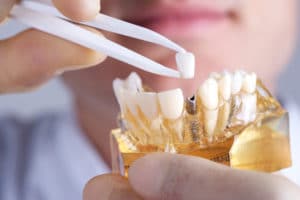
Because Dr. Westman uses our i-Cat Scan dental imaging system to create 3D images of the patient’s jaw when mapping his sites to place implants, this is not a problem with our practice. These are incredibly low-risk, high reward procedures.
What is the Recovery Process When Having a Dental Implant?
There are two slight recovery periods. The first comes after Dr. Westman places the titanium implant base into your jaw in the hole formerly occupied by the natural tooth root. To access the jawbone, Dr. Westman makes a small incision in the gum tissue. Once the implant is placed, the incision is closed with a couple of stitches. You’ll need to let this heal for a week or so. During this time you’ll eat mainly a soft diet. Pain is manageable with over-the-counter pain relievers.
The second slight recovery comes when Dr. Westman places the post onto the implant base. Again, he has to make a small incision in the gums to access the top of the implant base. He attaches the post (also known as the abutment) and then he closes the gum incision around the post. The gums have to heal around the post for two to three weeks. This initially involves some minor discomfort, but again it is manageable with over-the-counter medications.
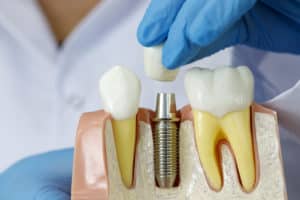
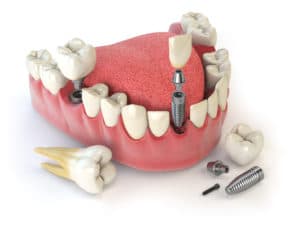
That’s all. There is no recovery when Dr. Westman attaches the artificial tooth to the post to complete the procedure.
How Long Do Dental Implants Last?
Dental implants are the longest-lasting dental prosthetic. In most cases, the implant lasts the remainder of the patient’s life. The artificial tooth may become damaged in rare situations, but this is easily replaced. The titanium implant base is a part of your jawbone and it will stay that way for the duration.
Will My Gums Grow Around the Implant?
The gums will grow around the implant and the crown. They will resemble the way they have grown around the adjacent natural teeth.
What Foods Will I Need to Avoid After Having a Dental Implant Placed?
The beauty of dental implants is that they feel and function exactly like a natural tooth. Because of that, there aren’t any restrictions on what you can or cannot eat with a dental implant. The artificial tooth/crown is made from dental porcelain and is quite hard and durable, but it can be broken if you do things like open a bottle with your teeth. So, you should ditch those habits to help ensure your implant will last for decades.
Cost of Dental Implants
No matter what your budget is, we know you care about your health. Dr. Westman wants to make sure you stay healthy as well and he will help you find solutions to make your dental treatments affordable for you. Dental implants Racine by Dr. Westman. The right choice.
What Should I Expect at My Dental Implant Consultation?
When you have a missing tooth or a couple teeth and you’re looking to have a dental implant placed, your consultation with Dr. Westman is all about him making sure you can have an implant. It is rare that a patient cannot have an implant because even if there has been bone loss Dr. Westman can place some bone grafting material to help the jaw build new mass to anchor the implant. This simply adds some time to the overall procedure.
During your consultation, Dr. Westman will do a CT scan of your mouth and jaw. This gives him insight into your jawbone mass and how it looks at the targeted implant location.
After determining you’re a good candidate, then the rest of your consultation will be devoted to walking you through the entire process. Dr. Westman wants his patients to be well-versed in any procedure they’re going to have, so he provides all the information you’ll need. He encourages you to ask any and all questions throughout your meeting.
Schedule A Consultation Today!
To learn more about dental implants please fill out our contact us form, or call 262.639.7000 today!
